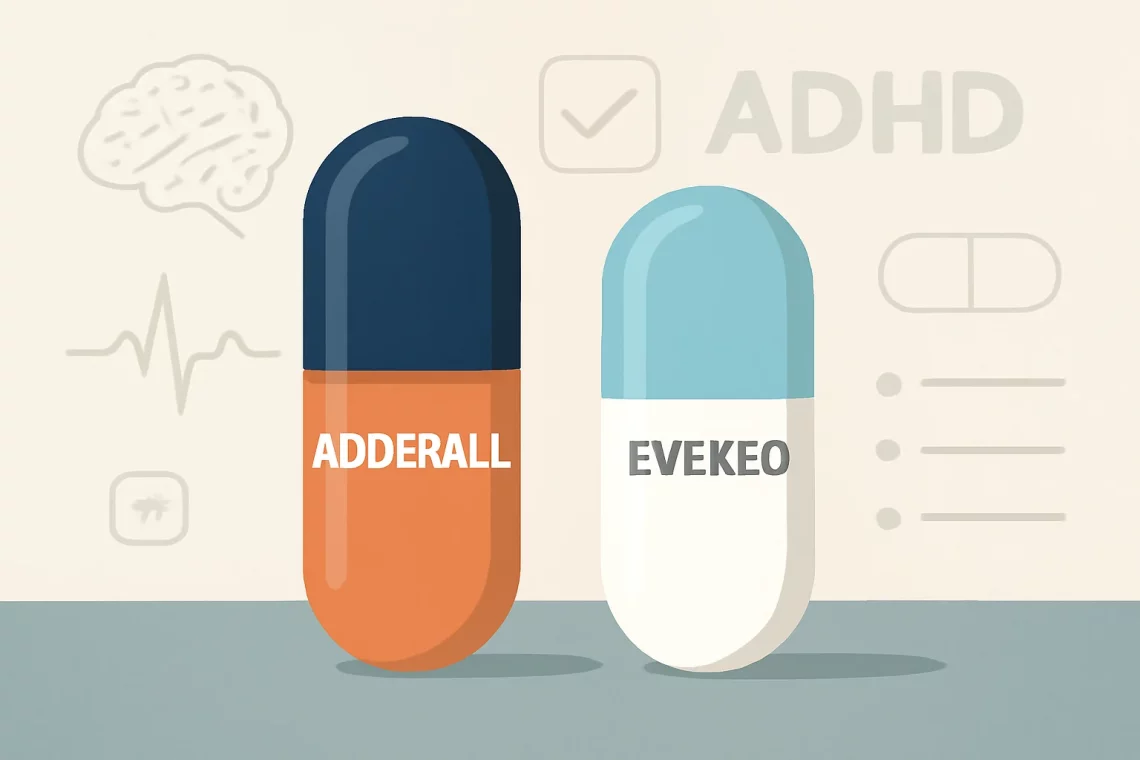
Adderall vs Evekeo: A Comprehensive Comparison of ADHD Medications
Adderall and Evekeo are two medications primarily used to treat Attention Deficit Hyperactivity Disorder (ADHD) and narcolepsy. They both belong to the stimulant class of drugs and share similar mechanisms of action, but there are notable differences between them that can affect their efficacy, side effects, and overall patient experience. As the prevalence of ADHD and related disorders increases, understanding these medications becomes essential for patients, caregivers, and healthcare providers.
The choice between Adderall and Evekeo can significantly impact an individual’s treatment journey. Factors such as dosage, formulation, and individual patient response can influence which medication is the most appropriate choice. Furthermore, both medications have distinct characteristics that can cater to different patient needs and preferences. With the ongoing dialogue around ADHD treatment options, it is crucial to explore the nuances of these two medications.
This article delves into the key differences and similarities between Adderall and Evekeo, providing insights into their composition, effectiveness, side effects, and considerations for patients. Whether you are a patient considering these medications or a caregiver seeking information, a deeper understanding of Adderall and Evekeo will empower informed decisions about ADHD and narcolepsy management.
Understanding Adderall
Adderall is a well-known medication used primarily for the treatment of ADHD and narcolepsy. It is a combination of two active ingredients: amphetamine and dextroamphetamine, both of which are stimulants that affect neurotransmitters in the brain. This combination works to enhance focus, attention, and impulse control in individuals diagnosed with ADHD. Adderall is available in both immediate-release and extended-release formulations, allowing for flexibility in how it is prescribed and administered.
The immediate-release version typically requires multiple doses throughout the day due to its shorter duration of action, whereas the extended-release version is designed to provide a more prolonged effect, often allowing for once-daily dosing. This can be particularly beneficial for individuals who require consistent symptom management throughout their day.
Adderall’s effectiveness in treating ADHD symptoms has been well-documented in clinical studies. Many patients report significant improvements in their ability to concentrate, complete tasks, and manage impulsive behaviors. However, like any medication, Adderall is not without its side effects. Common side effects can include insomnia, decreased appetite, dry mouth, and increased heart rate.
It’s vital for patients to communicate with their healthcare providers about their experiences while taking Adderall. Adjustments to dosage or a switch to another medication like Evekeo may be necessary if side effects become problematic or if the medication does not provide the desired level of symptom control. Overall, Adderall remains a widely prescribed and effective option for many individuals dealing with ADHD and narcolepsy.
Exploring Evekeo
Evekeo, on the other hand, is a single entity amphetamine formulation that also treats ADHD and narcolepsy. Unlike Adderall, which combines two different amphetamines, Evekeo contains only the active ingredient racemic amphetamine. This distinction may influence how the medication is metabolized and how effective it is for different patients.
Evekeo is available in an immediate-release formulation, which allows for flexible dosing similar to that of Adderall’s immediate-release version. Patients often find that Evekeo can provide symptom relief with a potentially different side effect profile. Some users report a smoother experience with fewer peaks and valleys in symptom control compared to Adderall, which can lead to a more stable daily routine.
The effectiveness of Evekeo in treating ADHD symptoms is supported by clinical evidence, although some patients may respond better to one medication than the other. The choice between Evekeo and Adderall can depend on individual factors such as previous medication trials, side effect tolerance, and personal preferences regarding dosing schedules.
As with any medication, it’s essential for patients to consult with their healthcare providers to determine whether Evekeo is the right fit for their treatment plan. Monitoring for side effects such as insomnia, decreased appetite, or anxiety is crucial, as medications can affect individuals differently. Overall, Evekeo presents a viable alternative to more conventional stimulant medications, catering to the diverse needs of patients seeking ADHD and narcolepsy management.
Comparative Effectiveness and Side Effects
When comparing Adderall and Evekeo, one of the most significant considerations is their effectiveness in managing ADHD symptoms. Both medications work primarily by increasing levels of neurotransmitters like dopamine and norepinephrine in the brain, which helps enhance focus and reduce impulsivity. However, individual responses can vary widely, leading some patients to prefer one medication over the other.
Clinical studies suggest that both medications are effective in treating ADHD, but some users report that they experience different side effects. Adderall, being a combination medication, may present a broader range of side effects due to its dual action. Common side effects can include increased heart rate, anxiety, insomnia, and appetite suppression. Some patients may find these side effects manageable, while others might struggle to tolerate them.
Evekeo, with its single active ingredient, may provide a more straightforward side effect profile for some individuals. Users have noted a potentially smoother experience with fewer side effects, but this can vary greatly from person to person. It’s essential for patients to keep track of how they feel while on either medication and to communicate any concerns with their healthcare provider.
Another critical aspect of choosing between Adderall and Evekeo is the potential for dependency and abuse. Both medications are classified as Schedule II controlled substances due to their stimulant properties. As such, they carry a risk of misuse and should be used strictly according to a healthcare provider’s instructions. Patients should be aware of this risk and engage in open discussions with their providers about their treatment options and any concerns.
Ultimately, the decision to use Adderall or Evekeo should be guided by a thorough evaluation of the patient’s unique needs, medical history, and response to treatment. Regular follow-ups and open communication with healthcare professionals can help ensure that patients receive the most effective and safe treatment for their condition.
Making an Informed Decision
Choosing between Adderall and Evekeo requires careful consideration and collaboration with healthcare providers. Patients should assess their symptoms, treatment history, and side effect tolerability when discussing potential medication options. This decision-making process can be enhanced by keeping a detailed journal of symptoms and any side effects experienced while on medication.
It’s also important for patients and caregivers to educate themselves about each medication’s formulation, dosing options, and potential interactions with other medications. This knowledge can empower patients to have informed discussions with their healthcare providers and advocate for their treatment preferences.
In addition to medication, comprehensive treatment for ADHD often involves behavioral therapies, lifestyle changes, and support systems. Engaging with mental health professionals, support groups, or educational resources can provide additional strategies and insights into managing ADHD effectively.
Ultimately, finding the right medication is a journey that may involve trial and error. Patience, persistence, and open communication with healthcare providers are key factors in achieving optimal treatment outcomes.
Remember, this article is not a substitute for professional medical advice. Always consult your healthcare provider regarding any health concerns or before making changes to your medication regimen.




